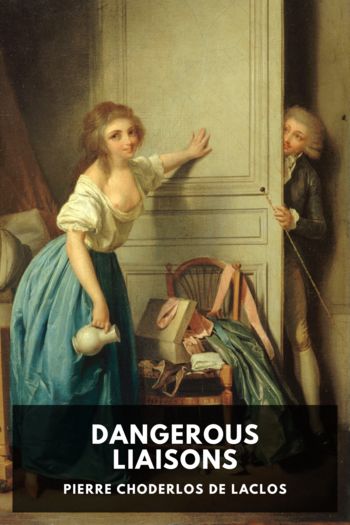Farewell, My Queen, Black Moishe [electric book reader .txt] 📗

- Author: Black Moishe
Book online «Farewell, My Queen, Black Moishe [electric book reader .txt] 📗». Author Black Moishe
“Did I? I have not really thought about it,” said Gabrielle de Polignac. (And she brushed aside a lock of hair that hid her forehead, below the rose she wore.)
“Talk to me. The truth is, I hardly know you. And if one day we were to be . . .Tell me more, my dear,” requested the Queen, as though her lips were pressed to this bubbling wellspring of candor, and she could never drink her fill.
“Majesty, I am perfectly satisfied with my lot. I believe it was ever thus. It is a trait of my character. But thanks to His Majesty’s generosity, my contentment is now beyond measure.”
Gabrielle de Polignac did not seem anxious for the conversation to take a more intimate turn. She did not like talking about herself and doubtless would have preferred going back to the game of naming colors. Since the Queen insisted, however, she was obliged to say something about her mother, who had died young and for whom she had not grieved. Even when she was still alive, her mother was not much present. Moreover, Gabrielle’s memories of her were scanty. She could vaguely recall a woman of elegant figure, charmingly adorned, saying good-bye to her, that was all . . .The woman bends over the little girl, and before the child has had time to respond in kind, her mother has gone. There is the faint echo of heels along the series of dark rooms in a provincial mansion, then nothing.
“When she died, I was relieved that there would be no more of those botched good-byes: she had finally contrived to leave. My father disappeared as well. But before going off to the South of France to live, he entrusted me to a female cousin of his. It was the same sort of provincial mansion, equally vast and gloomy, but almost bare of furniture. That was something I actually liked, all those empty rooms. When I turned fourteen, I went from that cousin’s home to be reared by my aunt, Countess d’Andlau, who had a position in the Household of the Countess d’Artois. It was my aunt that married me to Count Jules de Polignac, when I was seventeen. And . . . there is no more to tell, because since then I have known nothing but happiness.”
Gabrielle de Polignac had laughed; so had the Queen, but her laughter lacked conviction.
“Still, it was kind of your mother to think of you whenever she was going away.”
“The only pity is that she never thought of me at other times. But I have no right to blame her. I do not know the woman, I never did.”
They sat in silence, each absorbed by her own reflections, and suddenly a picture, remote in time but quite clear, formed in Gabrielle’s mind.
She must have been five or six years old when a chambermaid took her, a child left to her own devices for days on end, and set out to make her beautiful. After she had been thoroughly washed, after comb and brush had been carefully applied, the chambermaid had dressed her in a white dress, put a star in her hair, and—this was the marvelous part—she had fastened two large wings to her shoulders. Then she thrust her into an immense ballroom where people were dancing. Gabrielle had been afraid at first, but everyone had treated her with great consideration, congratulating her, standing aside to let her pass, and taking care not to ruffle her splendid feathers. The ball came to an end. For two or three days, the little girl walked the corridors with her wings still attached. At last she had encountered her mother, who said to her:
“What, still costumed, Miss! Don’t you know that everything comes to an end, even a masked ball?”
“Madam,” she had wept, “I have no one to take these wings off for me.”
“There, there, Gabrielle, don’t fret; I will help you, my little angel . . . ”
And it was her mother who had unhooked those wings for her.
“Not till that moment,” Madame de Polignac had said in closing, “was I completely overcome with sadness. Mortal sadness.”
And sadness had now returned. Together, they felt it wrap them round.
At one point, their conversation shifted to recent bits of gossip about the Princess de Lamballe. Louise de Lamballe was reported to be pregnant. To counter these rumors, the Princess was constantly on horseback. As a result, she was worn down with aches and pains.
“She ought to stop. She has a weak back.”
“It hurts even worse to be slandered. I believe I caught a glimpse of our dear Lamballe earlier, when we were coming out of the Council Chambers. She did look quite ill. But in that crowd of people waiting anxiously for us to appear, she looked no more haggard than many others. The only one who always has a radiant complexion is you. You are an oasis of light in that desolation of gloomy countenances. Gloomy, not necessarily out of compassion for me, I might add.”
Gabrielle de Polignac seized this opening to apologize for daring to set aside the rule about mourning raiment. It was not intended as an act of effrontery, but as a gesture to the Queen, who, in all the black surrounding her, might thus, at least in private, find repose for her eyes and heart in a pastel color, green, the color of hope . . .
“I have lost all hope. I am touched, however, that you should have thought of me when you chose the color of your dress, green, my favorite color . . .You dressed to please me . . .You are so thoughtful, Gabrielle, so generous. With you near to me, I feel





Comments (0)